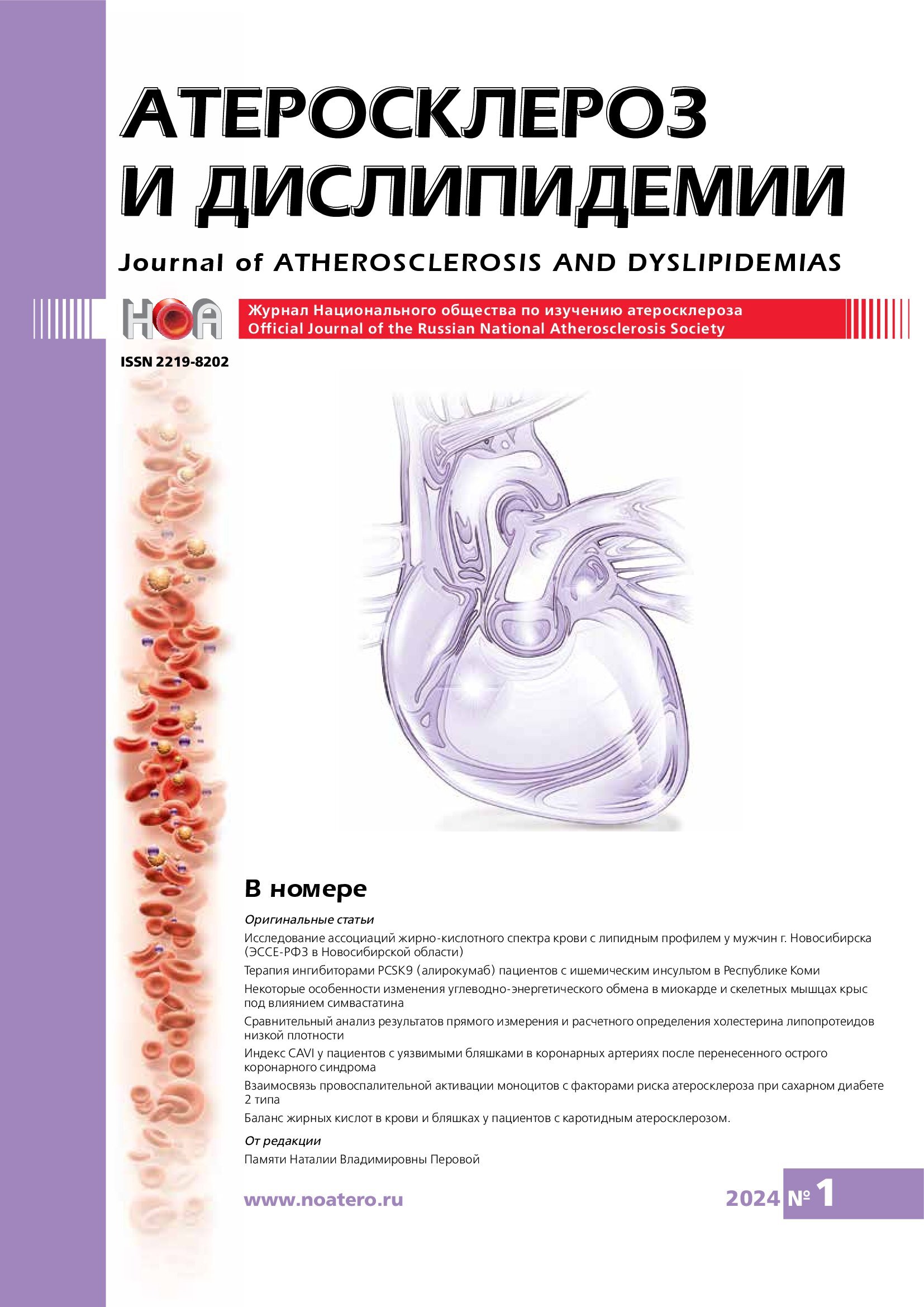The association of pro-inflammatory monocyte activation and risk factors for atherosclerosis in type 2 diabetes mellitus
DOI:
https://doi.org/10.34687/2219-8202.JAD.2024.01.0006Keywords:
diabetes mellitus, atherosclerosis, monocytes, proinflammatory cytokinesAbstract
Objective: Chronic inflammation plays an important role in the pathogenesis of type 2 diabetes, leading to active progression of atherosclerosis, which significantly increases cardiovascular mortality in patients with diabetes. The aim of the study was to assess the pro-inflammatory monocyte activation in type 2 diabetes and to determine its association with clinical characteristics of patients with type 2 diabetes, including cardiovascular risk factors and indicators of atherosclerosis.
Materials and methods: The study included 50 patients with newly diagnosed type 2 diabetes and 40 participants of the control group. The study participants were assessed for cardiovascular risk factors such as BMI, blood lipid profile, and indicators of carotid atherosclerosis. To characterize the proinflammatory activation of monocytes, basal and LPS-stimulated secretion of the
cytokines TNF-α, IL-6, IL-8 and MCP-1 was assessed in the primary culture of monocytes of study participants.
Results: Cardiovascular risk factors were significantly increased in the group of patients with type 2 diabetes, in particular, high BMI, high levels of triglycerides and LDL and reduced levels of HDL, increased cIMT of the carotid arteries and significantly higher degree of atherosclerotic carotid stenosis. The level of basal secretion of TNF-α, IL-6, IL-8 and MCP-1 was significantly higher in the group of patients with type 2 diabetes compared to participants in the control group. The levels of LPS-stimulated secretion were also higher in patients with type 2 diabetes, but only the chemokines IL-8 and MCP-1 showed significant differences between the groups. As a result of the correlation analysis, an association between IL-6 secretion and the levels of total cholesterol and triglycerides in the blood serum, an association between MCP-1 secretion and the level of triglycerides, and an association between TNF-α and IL-8 secretion and atherosclerotic stenosis in the carotid artery were revealed.
Conclusion: Thus, the study revealed pro-inflammatory activation of monocytes in patients with type 2 diabetes compared with participants of the control group, associated with atherosclerosis of the carotid arteries and blood lipid profile indicators, which is of interest for the development of new diagnostic algorithms and therapeutic strategies for diabetes 2 types.
Downloads
References
Hasheminasabgorji E, Jha JC. Dyslipidemia, Diabetes and Atherosclerosis: Role of Inflammation and ROS-Redox-Sensitive Factors. Biomedicines. 2021;9(11):1602. doi: 10.3390/biomedicines9111602.
Mao L, Yin R, Yang L, Zhao D. Role of advanced glycation end products on vascular smooth muscle cells under diabetic atherosclerosis. Front Endocrinol (Lausanne). 2022;13:983723. doi: 10.3389/fendo.2022.983723.
Shimobayashi M, Albert V, Woelnerhanssen B, Frei IC, Weissenberger D, Meyer-Gerspach AC, et al. Insulin resistance causes inflammation in adipose tissue. J Clin Invest. 2018;128(4):1538-1550. doi: 10.1172/JCI96139.
Ngcobo SR, Nkambule BB, Nyambuya TM, Mokgalaboni K, Ntsethe A, Mxinwa V, Ziqubu K, Ntamo Y, Nyawo TA, Dludla PV. Activated monocytes as a therapeutic target to attenuate vascular inflammation and lower cardiovascular disease-risk in patients with type 2 diabetes: A systematic review of preclinical and clinical studies. Biomed Pharmacother. 2022;146:112579. doi: 10.1016/j.biopha.2021.112579.
Touboul PJ, Hennerici MG, Meairs S, Adams H, Amarenco P, Bornstein N, et al. Mannheim carotid intima-media thickness and plaque consensus (2004-2006-2011). An update on behalf of the advisory board of the 3rd, 4th and 5th watching the risk symposia, at the 13th, 15th and 20th European Stroke Conferences, Mannheim, Germany, 2004, Brussels, Belgium, 2006, and Hamburg, Germany, 2011. Cerebrovasc Dis. 2012;34(4):290-296. doi: 10.1159/000343145.
Hathout G, Nayak N, Abdulla A, Huang J. The Revised Sonographic NASCET Index: A New Hemodynamic Parameter for the Assessment of Internal Carotid Artery Stenosis. Ultraschall Med. 2015;36(4):362-368. doi: 10.1055/s-0034-1385070.
Nikiforov NG, Wetzker R, Kubekina MV, Petukhova AV, Kirichenko TV, Orekhov AN. Trained Circulating Monocytes in Atherosclerosis: Ex Vivo Model Approach. Front Pharmacol. 2019;10:725. doi: 10.3389/fphar.2019.00725.
Moganti K, Li F, Schmuttermaier C, Riemann S, Klüter H, Gratchev A, Harmsen MC, Kzhyshkowska J. Hyperglycemia induces mixed M1/M2 cytokine profile in primary human monocyte-derived macrophages. Immunobiology. 2017;222(10):952-959. doi: 10.1016/j.imbio.2016.07.006.
Galstyan KO, Nedosugova LV, Martirosian NS, Nikiforov NG, Elizova NV, Kolmychkova KI, Sobenin IA, Orekhov AN. Modification of Tumor Necrosis Factor-α and C-C Motif Chemokine Ligand 18 Secretion by Monocytes Derived from Patients with Diabetic Foot Syndrome. Biology (Basel). 2019;9(1):3. doi: 10.3390/biology9010003.
Parisi L, Gini E, Baci D, Tremolati M, Fanuli M, Bassani B, Farronato G, Bruno A, Mortara L. Macrophage Polarization in Chronic Inflammatory Diseases: Killers or Builders? J Immunol Res. 2018;2018:8917804. doi: 10.1155/2018/8917804.
Thiem K, Stienstra R, Riksen NP, Keating ST. Trained immunity and diabetic vascular disease. Clin Sci (Lond). 2019;133(2):195-203. doi: 10.1042/CS20180905.
Nedosugova LV, Markina YV, Bochkareva LA, Kuzina IA, Petunina NA, Yudina IY, Kirichenko TV. Inflammatory Mechanisms of Diabetes and Its Vascular Complications. Biomedicines. 2022;10(5):1168. doi: 10.3390/biomedicines10051168.
Banu S, Sur D. Role of Macrophage in Type 2 Diabetes Mellitus: Macrophage Polarization a New Paradigm for Treatment of Type 2 Diabetes Mellitus. Endocr Metab Immune Disord Drug Targets. 2023;23(1):2-11. doi: 10.2174/1871530322666220630093359.
Yu H, Douglas HF, Wathieu D, Braun RA, Edomwande C, Lightell DJ Jr, Pham T, Klingenberg NC, Bishop SP, Khismatullin DB, Woods TC. Diabetes is accompanied by secretion of pro-atherosclerotic exosomes from vascular smooth muscle cells. Cardiovasc Diabetol. 2023;22(1):112. doi: 10.1186/s12933-023-01833-4.
Downloads
Published
How to Cite
Issue
Section
License
Copyright (c) 2024 Т. В. Кириченко, Л. А. Бочкарева, Л. В. Недосугова, Ю. В. Маркина, И. А. Кузина, Т. В. Толстик, А. И. Богатырева, A. M. Маркин

This work is licensed under a Creative Commons Attribution 4.0 International License.























